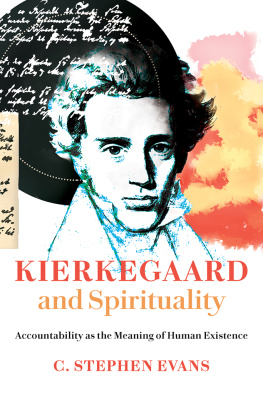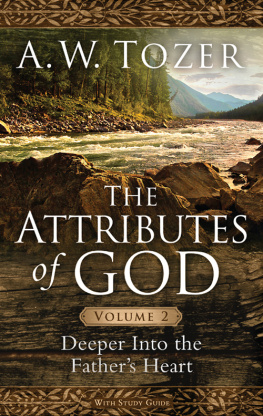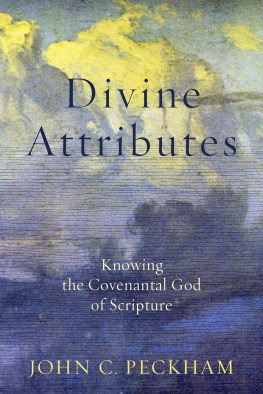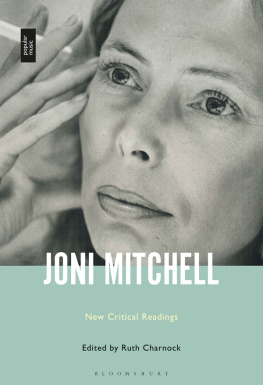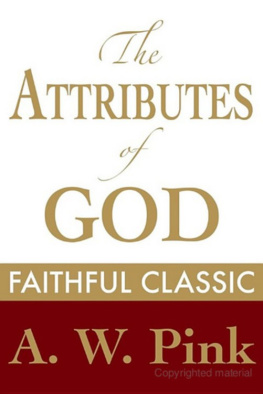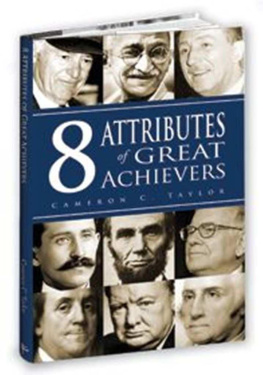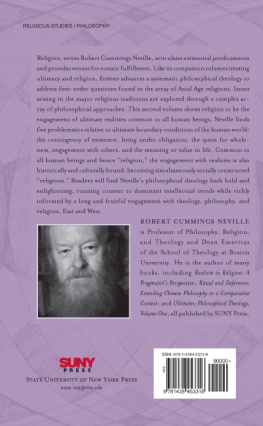Stephen Charnock - The Existence and Attributes of God: Volumes 1 & 2
Here you can read online Stephen Charnock - The Existence and Attributes of God: Volumes 1 & 2 full text of the book (entire story) in english for free. Download pdf and epub, get meaning, cover and reviews about this ebook. genre: Science. Description of the work, (preface) as well as reviews are available. Best literature library LitArk.com created for fans of good reading and offers a wide selection of genres:
Romance novel
Science fiction
Adventure
Detective
Science
History
Home and family
Prose
Art
Politics
Computer
Non-fiction
Religion
Business
Children
Humor
Choose a favorite category and find really read worthwhile books. Enjoy immersion in the world of imagination, feel the emotions of the characters or learn something new for yourself, make an fascinating discovery.

- Book:The Existence and Attributes of God: Volumes 1 & 2
- Author:
- Genre:
- Rating:5 / 5
- Favourites:Add to favourites
- Your mark:
- 100
- 1
- 2
- 3
- 4
- 5
The Existence and Attributes of God: Volumes 1 & 2: summary, description and annotation
We offer to read an annotation, description, summary or preface (depends on what the author of the book "The Existence and Attributes of God: Volumes 1 & 2" wrote himself). If you haven't found the necessary information about the book — write in the comments, we will try to find it.
The Existence and Attributes of God: Volumes 1 & 2 — read online for free the complete book (whole text) full work
Below is the text of the book, divided by pages. System saving the place of the last page read, allows you to conveniently read the book "The Existence and Attributes of God: Volumes 1 & 2" online for free, without having to search again every time where you left off. Put a bookmark, and you can go to the page where you finished reading at any time.
Font size:
Interval:
Bookmark:
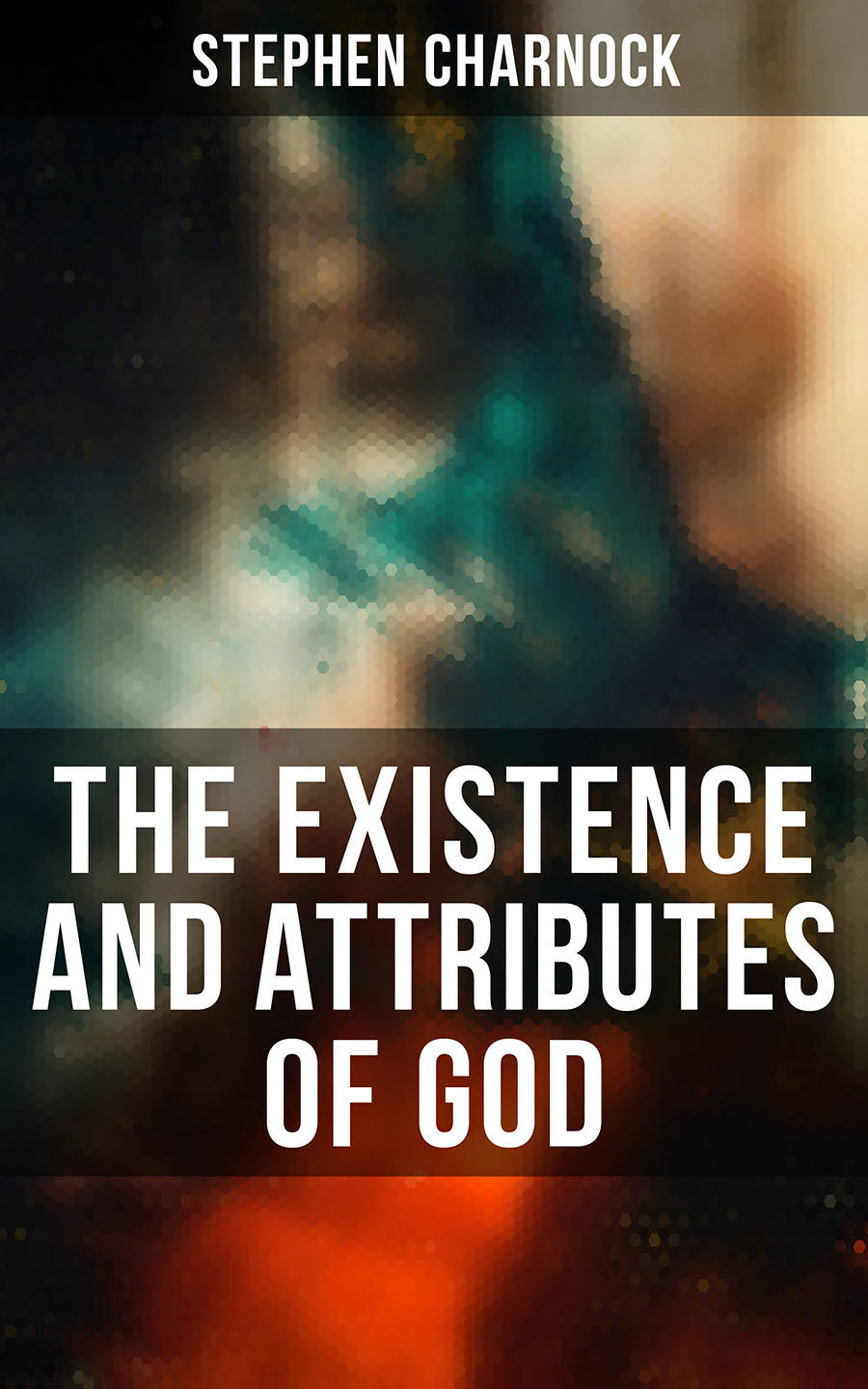

Stephen Charnock
The Existence and Attributes of God

Books
OK Publishing, 2020
Tous droits rservs.
EAN 4064066396190
Table of Contents
Stephen Charnock, B.D., was born in the year 1628, in the parish of St. Katharine Cree, London. His father, Mr. Richard Charnock, practised as a solicitor in the Court of Chancery, and was descended from a family of some antiquity in Lancashire. Stephen, after a course of preparatory study, entered himself, at an early period of life, a student in Emmanuel College, Cambridge, where he was placed under the immediate tuition of the celebrated Dr. William Sancroft, who became afterwards Archbishop of Canterbury. Although there is too much reason to fear that colleges seldom prove the spiritual birthplaces of the youth that attend them, it was otherwise in this case. The Sovereign Spirit, who worketh where and how he wills, had determined that this young man, while prosecuting his early studies, should undergo that essential change of heart which, besides yielding an amount of personal comfort, could not fail to exert a salutary influence on all his future inquiries, sanctify whatever learning he might hereafter acquire, and fit him for being eminently useful to thousands of his fellowcreatures. To this allimportant event we may safely trace the eminence to which, both as a Preacher and as a Divine, he afterwards attained,as he had thus a stimulus to exertion, a motive to vigorous and unremitting application, which could not otherwise have existed.
On his leaving the University he spent some time in a private family, either as a preceptor or for the purpose of qualifying himself the better for discharging the solemn and arduous duties of public life, on which he was about to enter. Soon after this, just as the Civil War broke out in England, he commenced his official labors as a minister of the gospel of peace, somewhere in Southwark. He does not appear to have held this situation long; but short as was his ministry there, it was not altogether without fruit. He who had made the student himself, while yet young, the subject of saving operations, was pleased also to give efficacy to the first efforts of the youthful pastor to win souls to Christ. Several individuals in this his first charge were led to own him as their spiritual father. Nor is this a solitary instance of the early ministry of an individual receiving that countenance from on high which has been withheld from the labors of his riper years. A circumstance this, full of encouragement to those who, in the days of youth, are entering with much fear and trembling on service in the Lords vineyard. At the time when they may feel impelled to exclaim with most vehemence, Who is sufficient for these things? God may cheer them with practical confirmations of the truth, that their sufficiency is of God.
In 1649, Charnock removed from Southwark to Oxford, where, through favor of the Parliamentary Visitors, he obtained a fellowship in New College; and, not long afterwards, in consequence of his own merits, was incorporated Master of Arts. His singular gifts, and unwearied exertions, so attracted the notice and gained the approbation of the learned and pious members of the University, that, in 1652, he was elevated to the dignity of Senior Proctor,an office which he continued to hold till 1656, and the duties of which he discharged in a way which brought equal honor to himself and benefit to the community.
When the period of his proctorship expired, he went to Ireland, where he resided in the family of Mr. Henry Cromwell, who had been appointed by his father, the Protector, to the government of that country. It is remarkable how many of the eminent divines, both of England and Scotland, have spent some part of their time in Ireland, either as chaplains to the army or as refugees from persecuting bigotry. Charnock seems to have gone thither in the capacity of chaplain to the Governor, an office which, in his case at least, proved no sinecure. During his residence in Dublin, he appears to have exercised his ministry with great regularity and zeal. He preached, we are told, every Lords day, with much acceptance, to an audience composed of persons of different religious denominations, and of opposite grades in society. His talents and worth attracted the members of other churches, and his connection with the family of the Governor secured the attendance of persons of rank. By these his ministrations were greatly esteemed and applauded; and it is hoped that to some of them they were also blessed. But even many who had no respect for his piety, and who reaped no saving benefits from his preaching, were unable to withhold their admiration of his learning and his gifts. Studying at once to be an ensample to the flock, and to walk within his house with a perfect heart, his qualities, both public and private, his appearances, whether in the pulpit or the domestic circle, commanded the esteem of all who were privileged to form his acquaintance. It is understood that the honorary degree of Bachelor in Divinity, which he held, was the gift of Trinity College, Dublin, conferred during his residence in that city.
The restoration of Charles, in 1660, put an end to Charnocks ministry in Ireland, and hindered his resuming it elsewhere for a considerable time. That event, leading, as it could not but do, to the reestablishment of arbitrary power, was followed, as a natural consequence, by the ejectment of many of the most godly ministers that ever lived. Among these was the excellent individual of whom we are now speaking. Accordingly, although on his return to England he took up his residence in London, he was not permitted to hold any pastoral charge there. Nevertheless, he continued to prosecute his studies with ardor, and occasionally exercised his gifts in a private way for fifteen years, during which time he paid some visits to the continent, especially to France and Holland.
At length, in 1675, when the restrictions of the government were so far relaxed, he accepted a call from a congregation in Crosby Square, to become copastor with the Rev. Thomas Watson, the ejected minister of St. Stephens, Walbrook, who, soon after the Act of Uniformity, had collected a church in that place. Mr. Watson was an eminent Presbyterian divine, and the society which he was instrumental in founding became afterwards, under the ministry of Dr. Grosvenor, one of the most flourishing in the city, in respect both of numbers and of wealth. It may not be uninteresting here to insert a few brief notices respecting the place of worship which this congregation occupied, being the scene of Charnocks labors during a principal part of his ministry, and that in connection with which he closed his official career.
The place in which this humble Presbyterian congregation assembled was a large hall of Crosby House, an ancient mansion on the east side of Bishopgate Street, erected by Sir John Crosby, Sheriff and Alderman of London, in 1470. After passing through the hands of several occupants, and, among others, those of Richard III., who thought it not unfit for being a royal residence, it became, about the year 1640, the property of Alderman Sir John Langham, a staunch Presbyterian and Loyalist. A calamitous fire afterwards so injured the building, as to render it unsuitable for a family residence; but the hall, celebrated for its magnificent oaken ceiling, happily escaped the conflagration, and was converted into a meetinghouse for Mr. Watsons congregation, of which the proprietor is supposed to have been a member. The structure, though greatly dilapidated, still exists, and is said to be regarded as one of the most perfect specimens of the domestic architecture of the fifteenth century now remaining in the metropolis. But, as an illustration of the vicissitudes such edifices are destined to undergo, it may be stated that Crosby Hall, after having witnessed the splendors of royalty, and been consecrated to the solemnities of divine worship, was latelyperhaps it is stilldedicated to the inferior, if not ignoble, uses of a woolpacker.
Font size:
Interval:
Bookmark:
Similar books «The Existence and Attributes of God: Volumes 1 & 2»
Look at similar books to The Existence and Attributes of God: Volumes 1 & 2. We have selected literature similar in name and meaning in the hope of providing readers with more options to find new, interesting, not yet read works.
Discussion, reviews of the book The Existence and Attributes of God: Volumes 1 & 2 and just readers' own opinions. Leave your comments, write what you think about the work, its meaning or the main characters. Specify what exactly you liked and what you didn't like, and why you think so.

